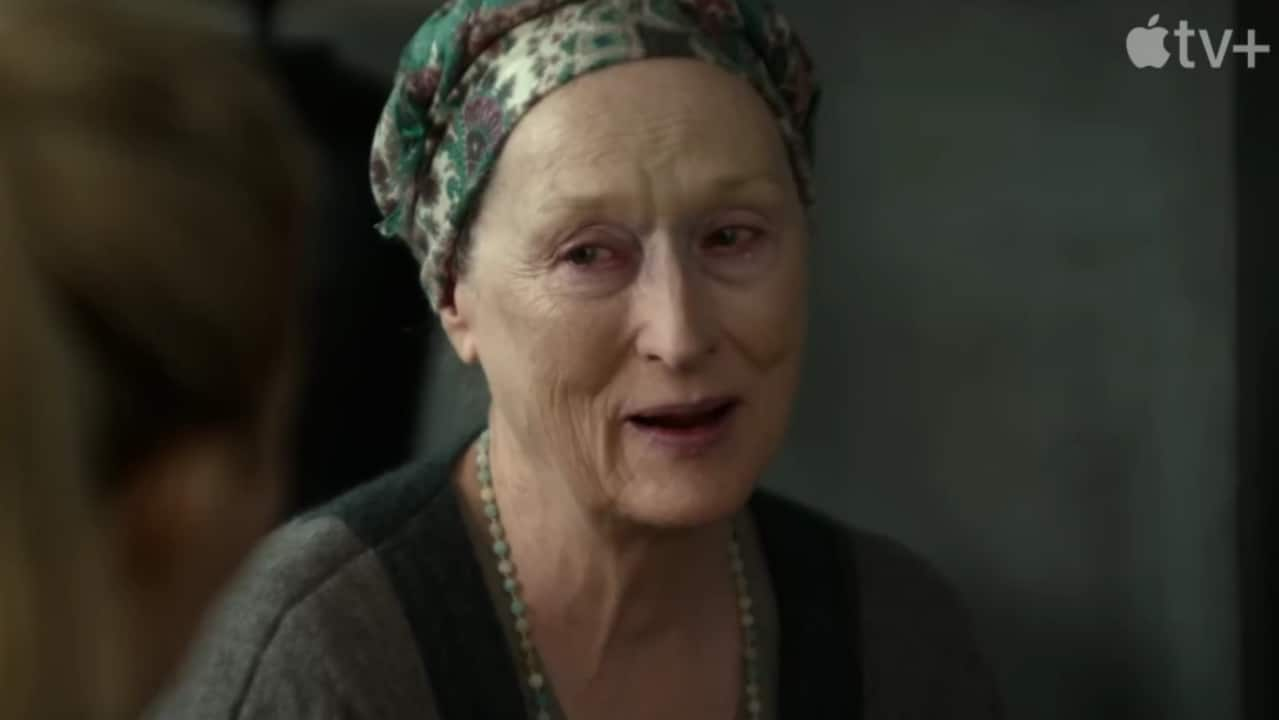



A truck driver has been called for a job to Mumbai. He walks past a hectic, crowded city market, typically overflowing with hawkers, small-time vendors, gaudy signs and vague noises. Everything is reminiscent of present-day Mumbai except the items being sold. One vendor sells oxygen, charging people by the minute so they can stop by and take a lung-full of clean air. Another can be seen selling bajra and other hard seeds that ‘heat cannot ruin’. This, claustrophobic, hippie and dilapidated vision of hell is India as it might look like in 2059. Apple TV’s Extrapolations is a climate change anthology that speculates on the end times. It boasts of a breath-taking cast that includes Meryl Streep, Marion Cotillard and Edward Norton, but it’s the show’s fifth episode, set entirely in India, that presents a worrying, almost chastening image of the destination to which we are all witlessly headed.
 Meryl Streep in Extrapolations. (Screen grab)
Meryl Streep in Extrapolations. (Screen grab)Climate fiction has reared its head in the streaming age in India, but it has rarely attempted to fashion a futuristic image, as opposed to the aggrieved present. Extrapolations, which has clearly spared no expense, thankfully, goes where few Indian efforts have gone before – to offer a futuristic, edgy and ultimately horrifying portrayal of an India besieged by disastrous climatic shifts. The fifth episode, directed by Richie Mehta (Delhi Crime season 1) stars Adarsh Gourav, as Gaurav, a driver who has been tasked with transporting a secret cargo across state lines. Gaurav is accompanied on his mission by Neel (Gaz Choudhry), a wheelchair-bound ex-soldier.
Transporting untagged luggage across the Indian midlands, shouldn’t sound like a chore, but in the year 2059, things have become complicated. The normalization of wet bulb temperatures has forced people to adapt to harsh climate realities. Like vampires, they now live in the night and sleep during the day. Food grains are in short supply. The oxygen in the air, isn’t sufficient for lung-busting walks so you have to take ‘supplements’ every few minutes. During the day, people sleep inside oxygen-controlled body suits, so they don’t choke from the pollution in their sleep. Inequality and access in this context are unexplored, but for the duration of its 50-minute runtime, the episode seeks to provoke, if not sufficiently survey. There is even a hint a sectarian politics having survived, evidently, even a climate catastrophe.
Gaurav’s mission is to first drive Neel and the cargo to Banaras. Once he makes it, he is then urged to carry it further to Amritsar, along with the heat-stricken scientist (Waris Ahluwalia) who would know what to do with it. Waris is barely lucid because of a heat stroke, a phenomenon that has become as common as voiding your bladder. In one sequence, the travelling party try to rescue a street urchin, who collapses as soon as he exposes himself to the sun. It points to a surreal age, where nature has withdrawn the bounty of its lap, to replace it with the scourge of some sort of climatic revenge. This is the planet that we have created for ourselves.
This one episode itself is haunting enough to make you squirm at its dystopian vision of India that, though it doesn’t achieve scale, conveys the hellish nature of life several decades down the pipeline of passivity and denial. From requiring state-of-the-art imported vehicles to merely travel during the day, to oxygenated body bags, this feels like a world running on fumes, barely managing to identifying itself as alive, without ever really feeling so. What’s more interesting, however, is that a majority of the speculative cues here seem to be inspired by events that have already transpired. From Delhi’s oxygen cafes to Mumbai’s unfancied brush most recently with NCR-like pollution, there is, to anyone who can possibly glean from symptoms the part of the body that is ailing, more to come.
When it comes to climate speculation, it’s impossible to fault a story for getting things right or wrong. Extrapolations merely adds material gloss to the many theoretical projections scientists have already made. On the cusp of what could be India’s most brutal summer yet, it sounds less like provocation and more like a warning. The world is heating, the cities are becoming unliveable, and yet there is this resistance to accommodate the obvious. Even when it might be the closest thing to reality there is. To which effect Extrapolations, as a whole can at times feel frustratingly too big and aspirational for its own good. In the theatre of imagination, a few tricks are good, but a few too many can turn into a circus. But look past the entire series, and focus on what it is attempting to say about our near future, and there is meat be chew, thoughts to consider and worries to prepone and prepare for. Damned if you do. Damned you certainly will be, if you don’t.
Discover the latest Business News, Sensex, and Nifty updates. Obtain Personal Finance insights, tax queries, and expert opinions on Moneycontrol or download the Moneycontrol App to stay updated!
Find the best of Al News in one place, specially curated for you every weekend.
Stay on top of the latest tech trends and biggest startup news.